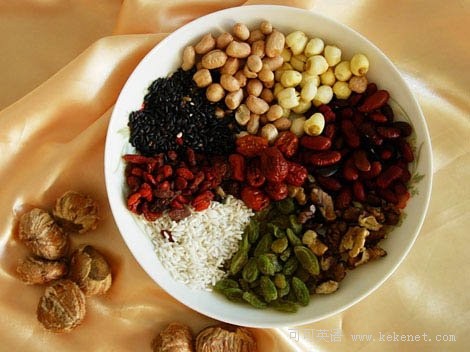
и…ҠжңҲеҲқе…«пјҢжҲ‘еӣҪдәәж°‘жңүеҗғи…Ҡе…«зІҘд№ дҝ—гҖӮжҚ®иҜҙи…Ҡе…«зІҘдј иҮӘеҚ°еәҰпјҢе’ҢдҪӣж•ҷе§ӢзҘ–йҮҠиҝҰзүҹе°јжңүе…ігҖӮйҮҠиҝҰзүҹе°јжң¬жҳҜеҸӨеҚ°еәҰеҢ—йғЁиҝҰжҜ—зҪ—еҚ«еӣҪпјҲд»Ҡе°јжіҠе°”еўғеҶ…пјүеҮҖйҘӯзҺӢзҡ„е„ҝеӯҗпјҢд»–и§Ғдј—з”ҹеҸ—з”ҹиҖҒз—…жӯ»зӯүз—ӣиӢҰжҠҳзЈЁпјҢеҸҲдёҚж»ЎеҪ“ж—¶е©ҶзҪ—й—Ёзҡ„зҘһжқғз»ҹжІ»пјҢиҲҚејғзҺӢдҪҚпјҢеҮә家дҝ®йҒ“гҖӮеҲқж— ж”¶иҺ·пјҢеҗҺз»Ҹе…ӯе№ҙиӢҰиЎҢпјҢдәҺи…ҠжңҲе…«ж—ҘеңЁиҸ©жҸҗж ‘дёӢжӮҹйҒ“жҲҗдҪӣгҖӮеңЁиҝҷе…ӯе№ҙиӢҰиЎҢдёӯпјҢжҜҸж—Ҙд»…йЈҹдёҖйә»дёҖзұігҖӮеҗҺдәәдёҚеҝҳд»–жүҖеҸ—зҡ„иӢҰйҡҫпјҢдәҺжҜҸе№ҙи…ҠжңҲеҲқе…«еҗғзІҘд»ҘеҒҡзәӘеҝөгҖӮвҖңи…Ҡе…«вҖқе°ұжҲҗдәҶвҖңдҪӣзҘ–жҲҗйҒ“зәӘеҝөж—ҘвҖқгҖӮи…Ҡе…«зІҘеңЁеҸӨж—¶жҳҜз”Ёзәўе°ҸиұҶгҖҒзіҜзұіз…®жҲҗпјҢзҺ°еңЁеңЁдёӯеӣҪеҗ„ең°и…Ҡе…«зІҘзҡ„иҠұж ·пјҢдәүеҘҮз«һе·§пјҢе“Ғз§Қз№ҒеӨҡгҖӮ
Laba is celebrated on the eighth day of the last lunar month, referring to the traditional start of celebrations for the Chinese New Year. "La" in Chinese means the 12th lunar month and "ba" means eight.
Legends about the origin of this festivity abound. One holds that over 3,000 years ago sacrificial rites called "La "(и…Ҡ) were held in the twelfth lunar month when people offered their preys to the gods of heaven and earth. The Chinese characters for prey (зҢҺзү©) and the twelfth month (и…Ҡ) were interchangeable then, and ever since "La" has been used to refer to both.
Since the festival was held on the eighth day of the Last month, people later appended the number eight ("ba" in Chinese), giving us the current Laba .














